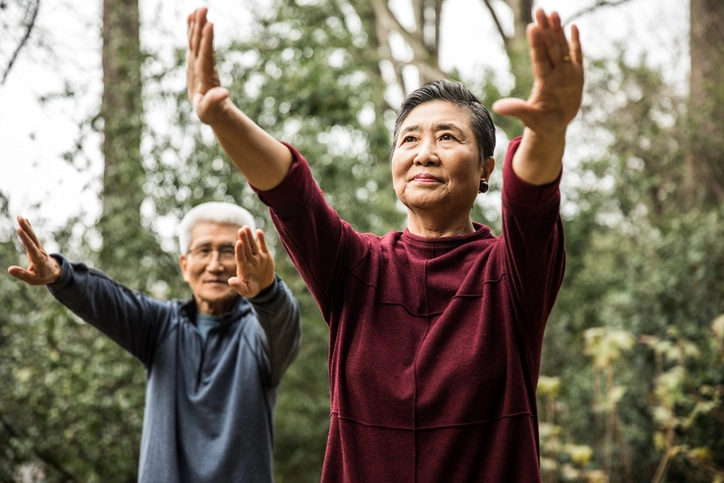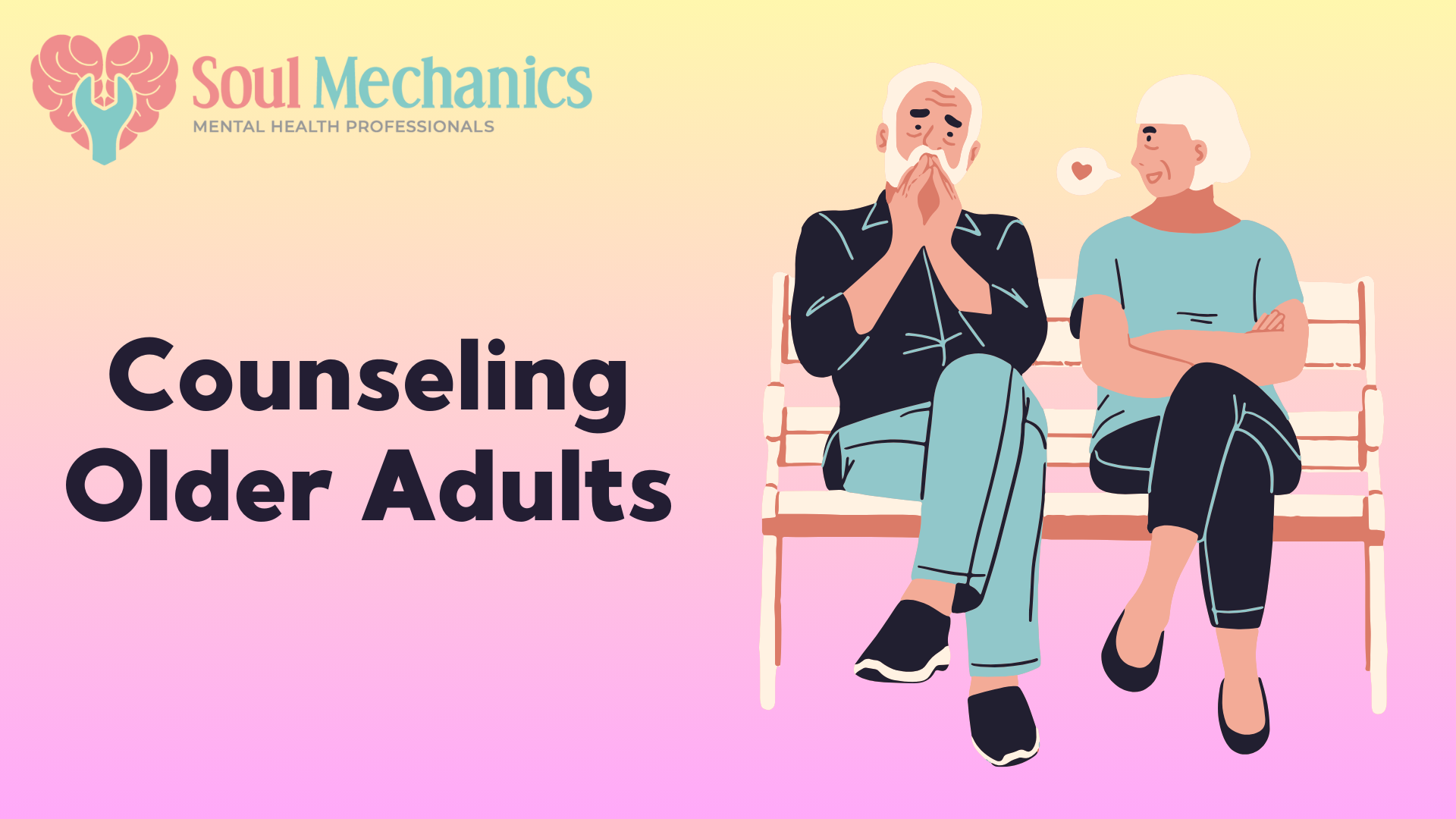Counselling Older Adults
Counselling Older Adults

Written By: Kelly Chan Jia Li, Clinical Psychologist (MAHPC(CP)00353)

Ageing is a journey marked by many challenges, and as the years roll by, older adults often face unique challenges, ranging from adjusting to retirement to coping with loss and health concerns. In these moments, counselling emerges as a guiding light, offering support, understanding, and a compassionate space to navigate their golden years.
This article will explore how counselling works for older adults to make a meaningful difference in their lives.
Reminder: If you or your loved ones are struggling with mental health conditions, please don't hesitate to reach out to us at Soul Mechanics KD or Soul Mechanics Ipoh. Remember, seeking help is not a sign of weakness but strength!
The Who?
Older adults are typically 65 years of age or older with varying levels of physical, cognitive, and emotional health. Some of them may experience chronic health conditions such as arthritis or diabetes, while others may remain active and healthy well into their 80s or 90s. However, older adults may have limited access to healthcare services, hindering their ability to receive appropriate care and support for their emotional well-being. Hence, counselling for older adults can play a crucial role in addressing their emotional health needs by providing a safe and understanding space to express their concerns and connect with others facing similar challenges.
Common Issues Addressed in Counselling for Older Adults
Grief and Loss
Older adults may experience grief due to the loss of a spouse, family member, or close friend. Counselling provides a supportive space to navigate difficult emotions and find healthy coping methods.

Adjustment to Life Transitions
Life transitions, such as retirement, relocation, or changes in health, can be challenging. Counselling helps older adults adjust to these transitions, explore new possibilities, and redefine their sense of purpose.
Health-related Anxiety
Coping with chronic illness, managing pain, or facing concerns about one's health can lead to anxiety. Counselling offers strategies to address health-related concerns and maintain a positive outlook on life.
Cognitive Decline
For those experiencing cognitive decline or dealing with conditions like dementia, counselling can provide emotional support, help manage stress, and involve family members in the process of understanding and adapting to changes.
Isolation and Loneliness

Older adults may feel isolated and lonely, especially if they have lost social connections. Counselling assists in building social skills, finding community engagement opportunities, and enhancing interpersonal relationships.
Reminder: If you or your loved ones are struggling with mental health conditions, please don't hesitate to reach out to us at Soul Mechanics KD or Soul Mechanics Ipoh. Remember, seeking help is not a sign of weakness but strength!
What to Expect from Therapy?
Creating a Safe Space for Expression: A Comfortable Setting
Counselling for older adults begins with establishing a safe and comfortable environment. The counselling space is designed to be a haven where older adults can freely express their thoughts, emotions, and concerns without fear of judgment.
Collaborative Effort: Sharing Stories and Active Listening
The process often starts with sharing stories. Therapists will encourage older adults to share their experiences, memories, and challenges. Sharing personal narratives serves as a cathartic release, paving the way for understanding and healing.
Therapists will then actively listen by genuinely hearing and understanding what the older adult is expressing. This empathetic approach fosters a sense of connection and trust, making the environment conducive to open and honest communication.
It Takes Two to Tango: Collaborative Goal Setting
Counselling involves a collaborative process where the therapist and the older adult work together to identify goals. These goals could include improving emotional well-being, developing coping strategies, or enhancing relationships.
A Tailored Support
Recognizing that every older adult is unique, therapists will tailor their approaches to meet their needs. Some older adults may prefer one-on-one sessions, while others may benefit from group therapy or involve family members in the process.

- Individual counselling for older adults provides a safe and confidential space for them to explore their thoughts, feelings, and concerns. In one-on-one sessions, the focus remains solely on the older adult, providing an opportunity for a deeper exploration of their problems. This allows the therapist to understand their experiences and challenges.
- Group counselling provides a supportive environment where older adults can connect with peers facing similar challenges. This sense of community and shared experiences can be incredibly valuable in reducing feelings of isolation and providing a support network. Group counselling also offers opportunities for older adults to learn from others, gain new perspectives, and develop interpersonal skills.
- Family counselling involves family members in the counselling process to address issues that may affect the older adult's overall well-being and their relationships with loved ones. This approach recognizes the interconnectedness of family dynamics and aims to address the unique challenges faced by families as they navigate the ageing process. This also creates a platform for open communication and understanding.
How Can Therapy Help?
Developing Coping Mechanisms
Therapists equip older adults with practical coping mechanisms that can be applied in their everyday lives. These strategies empower individuals to navigate challenges independently and build resilience in adversity.
Enhance Emotional Well-Being
Many counselling sessions incorporate a life review to encourage reflection on past experiences. This process helps older adults find meaning, celebrate accomplishments, and foster a positive self-image.
Fostering Connections

Counselling often helps older adults develop strategies to build and maintain social connections. Whether through community groups, volunteering, or strengthening existing relationships, counselling fosters a sense of connection.
Building Resilience
Therapists work with older adults to build resilience, emphasizing strengths and coping mechanisms. This approach helps them navigate challenges and transitions, fostering a sense of empowerment and self-efficacy.
Breaking Barriers Associated with Counselling for Older Adults
Generational Misconceptions
Older adults may hold traditional views that seeking help is often seen as a sign of weakness or failure. They may have grown up in a time when mental health was not openly discussed or understood, making it even more difficult for them to reach out for assistance. In reality, mental health is a crucial aspect of overall well-being at any age. Counselling provides a supportive space for addressing emotional challenges, regardless of generational attitudes.
Belief in the Inevitability of Aging Challenges
Some older adults may believe that challenges associated with ageing, such as grief or loneliness, are inevitable and should be accepted without seeking external help. In reality, while ageing comes with challenges, counselling provides valuable support and coping strategies to enhance the quality of life during the later years.
Medicalization of Mental Health
Some older adults may view mental health concerns as solely medical issues, leading to a preference for medical interventions over counselling. In reality, counselling complements medical care by addressing the emotional and psychological aspects of well-being, promoting holistic health.
What are Your Thoughts?

In conclusion, counselling for older adults is a compassionate journey that empowers them to face the challenges of ageing with resilience and grace. Counselling becomes a valuable tool for navigating the complexities of growing older. As we strive to understand and appreciate the importance of counselling for older adults, we contribute to a society that values the well-being of individuals at every stage of life. In the ageing journey, counselling can be the hopeful light in guiding older adults toward a fulfilling later life.
If you’re looking for a therapist in Kota Damansara or Ipoh area, you can click here for more information.
If you enjoyed reading this, why not broaden the horizon of knowledge by learning about "ADHD Assessment in Adults: What to Expect"?
You can read the blog here.
For more content related to mental health do follow us on our official Instagram.

